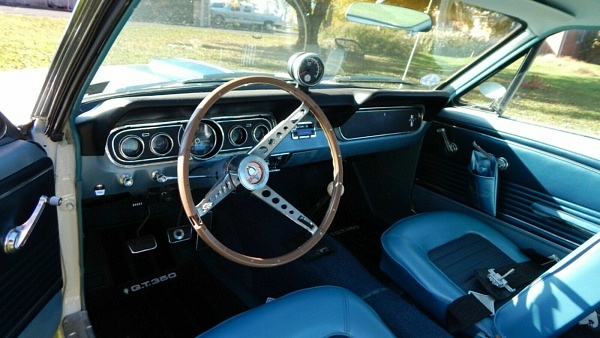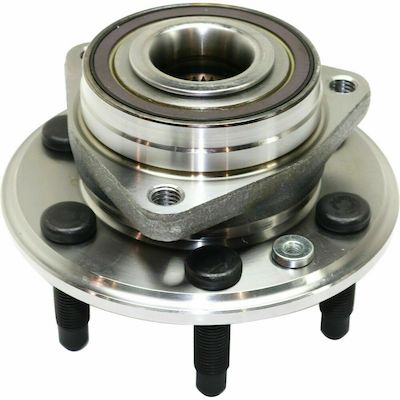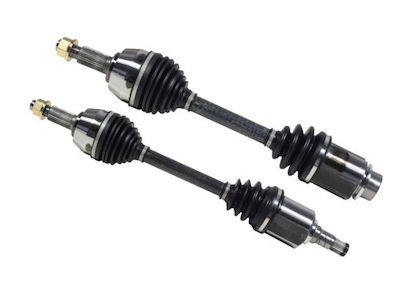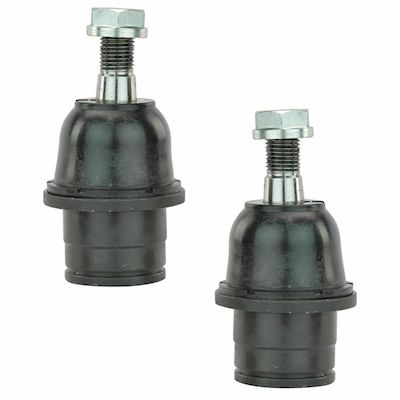Contents
When your steering wheel shakes, whines or screeches, it’s a warning sign. We strongly recommend paying attention to what your steering is trying to tell you.
Here’s the good news. After you pin down the cause, common steering ailments are usually easy to fix without spending a king’s ransom.
A bit of armchair diagnosis can go a long way. Start by answering the following questions.

When a steering wheel is off-center and the front wheels are straight, it’s time for an alignment.
Why Is My Steering Wheel Turned to the Side?
If your vehicle’s steering wheel is off-center, but your car is moving in a straight line, then you probably have a wheel alignment issue. Poor alignment is more common than you think—but it’s an easy fix.
The best repair shops employ skilled technicians who use high-tech four-wheel machines to get all four wheels aligned. It usually costs less than $100 and takes about one hour. Done and done.
Why Does My Steering Wheel Shake or Vibrate?

Replacing the wheel bearing and hub assembly can cure pesky vibration issues.
Does your steering wheel vibrate or shake when your vehicle reaches speed? Those are signs of unbalanced tires, poor wheel alignment, or lousy tie rods. A sticky brake caliper can also cause vibrations—although it’s not as common.
If the vibration occurs at lower speeds, there could be a problem with the suspension system. However, if the shaking mostly happens when you turn, a bad wheel bearing could be the problem.
Why Is My Steering Wheel Making Noises?
New noises coming from your steering wheel are a sign of problems with your suspension or steering rack. But you’ll need to sharpen your listening skills to interpret the type of noise: a clunk means something different than a crunch—or a squeak, whine, or moan. Here’s a quick list of the common steering noises and the related source:

Bad CV joints can cause vibration, as well as knocking, popping, and clicking noises
Clunking or knocking: upper strut bearings, tie rod ends, sway bar link
Crunching at high speed: CV joints
Grinding or clicking while turning: CV joints, low power steering fluid
Squeaking or crunching at low speed: ball joints
Squealing or screeching: lower power steering fluid
Whining or moaning: power steering pump, low power steering fluid
Why Is My Steering Wheel Suddenly Tight or Loose?

Loose steering? Bad ball joints may be the culprit.
If your vehicle’s steering has suddenly become tighter or looser, there could be a few different culprits. Older cars might need to replace the following components based on what you’re experiencing.
Tighter steering: upper strut bearings, power steering rack (most notably when cold), steering shaft joint
Looser steering: rack and pinion, steering box, linkage, ball joints, tie rod ends, control arm bushings
An interruption of the flow of electricity to an electric power steering system will result in the loss of power assist. In this case, the steering will feel very heavy all of a sudden. This might indicate a short somewhere in the electrical system.

Strange noise in your Ferrari Portofino? Knock wood that it’s under warranty.
Why Is My Car Leaking Red, Pink, or Foamy Stuff?
If you see an oddly colored puddle underneath the front of your vehicle, it’s time to investigate. A puddle of pungent and red or pink is likely to be power steering fluid (which is engineered to smell bad.) If there’s a whining noise under the hood, you probably have a leak in the power steering system.
Also read this: Why Does My Car Smell Like Eggs, Crayons or Other Odd Things?
To DIY or Not?
Diagnosing the cause of your steering woes will help you assess whether a DIY fix is practical. Or perhaps you’ll need work done by a qualified mechanic.
In any case, you’ll want to have a four-wheel alignment done after any suspension components are replaced. Driving a vehicle with poor alignment will only lead to more repairs down the road.
(Photo at top courtesy of Nenad Stojkovic)





